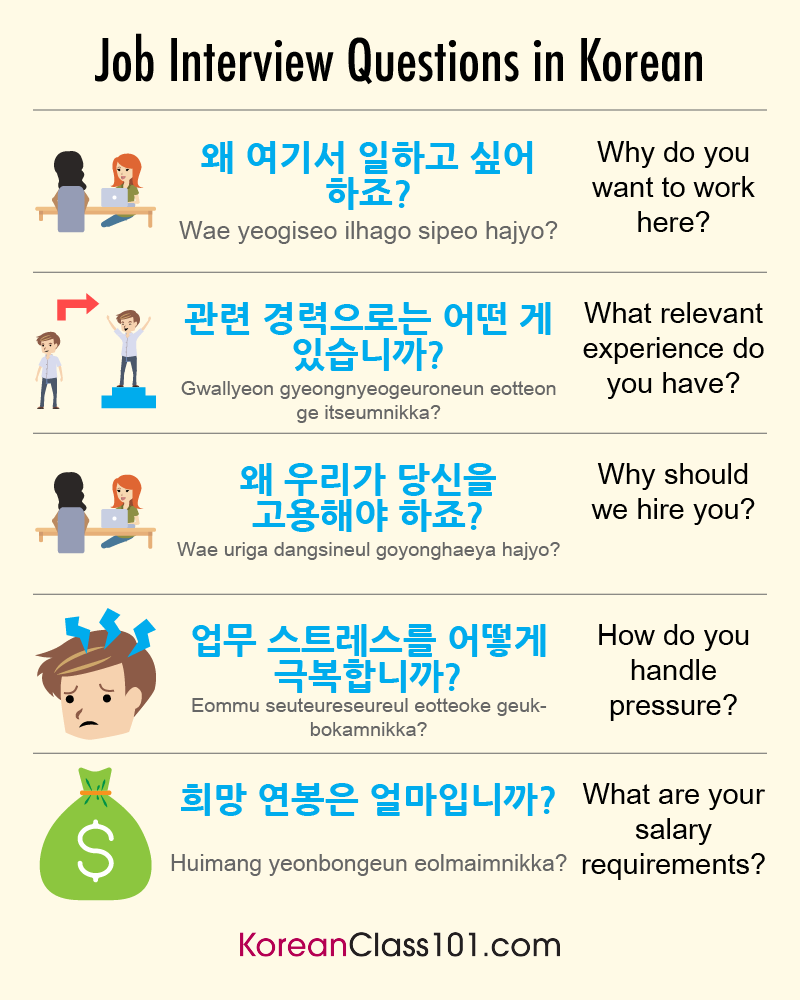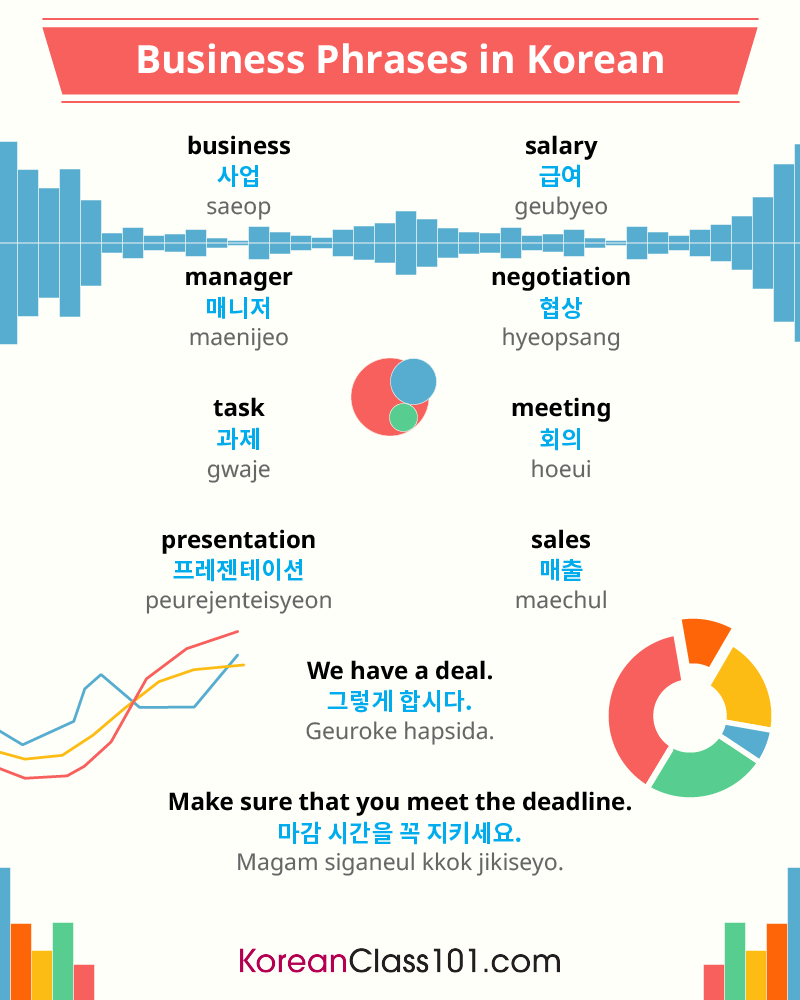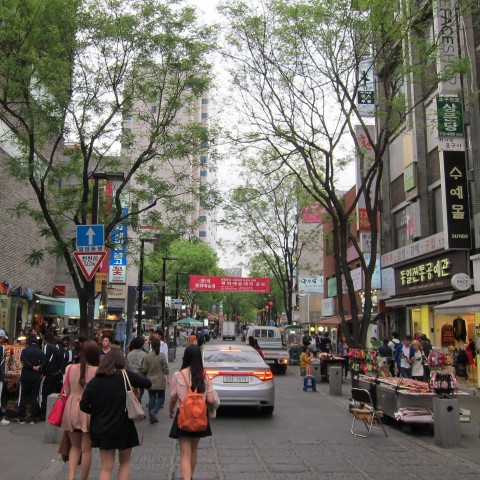Working abroad is a great way to explore and immerse yourself in the local culture. Many Korean learners want to work in South Korea, and the number of foreigners who are employed by a Korean company is increasing every year. There are a few things that foreigners finding jobs in Korea need to know, so we’ve put together this guide for you.
Start with a bonus, and download the Business Words & Phrases PDF for FREE! (Logged-In Member Only)
Table of Contents
- Benefits of Working in Korea
- The Most Popular Jobs in Korea
- Visa Requirements to Work in Korea
- Do I Need to Speak Korean to Work in South Korea?
- Popular Korean Job Hunting Sites
- Quick Tips for Korean CV and Resume
- Most Common Job Interview Questions in Korea
- How KoreanClass101 Can Help You with Finding a Job in Korea
1. Benefits of Working in Korea
So what’s the benefit of working in Korea? Many people wonder how much their income would be, but it totally depends on your work experience and the company you work for. So it’s important to consult with a recruiter if you want to know the average income you can expect in a specific position or an industry you wish to work in.
1- Overseas Work Experience
Working abroad gives you many benefits in your career development, as many companies appreciate candidates with abroad work experience. Korea has its unique working system and environment, and therefore by working and living in Korea, you’ll definitely enjoy your stay.
2- Korean Leisure Culture
There’s a lot to do for fun in South Korea and you can enjoy many leisures at a low cost. To give you a better idea of what to expect when working and living in Korea, we’ve explained in detail about how much it costs to live in Korea (focusing on Seoul). Feel free to read it.
3- Low Crime Rate
Korea possesses one of the lowest crime rates in the world. CCTVs are installed on every corner of every street and inside buildings. You’ll see a police car driving around the streets at night, and there’s even a free service, for women, where two volunteer workers walk home with you at night.

2. The Most Popular Jobs in Korea
We know it can be stressful searching for foreigners-friendly jobs in Korea, so we thought we’d put together a quick list of the most popular ones. One of the most common jobs that foreigners do in South Korea is teaching a language, especially English, due to high demand. Moreover, you can also find an office job in Korea. If you’re planning to stay in Korea for a year and want to find a part-time job in Korea, this is also a viable option. Below is a quick overview of the most famous jobs that foreigners do in South Korea:
1- Language Teaching Jobs
If you’re a native English speaker who wants to have a career in teaching, finding a job will be a lot easier for you in Korea. There are many advantages of being a language teacher. Firstly, the majority of companies will provide free accomodation and take care of the visa process, meaning you don’t need to worry too much about the initial hiring process period. Some companies even provide free lunch as well. The pay for language teaching jobs in Korea is very decent, usually ranging between 2,000,000 KRW ~ 3,000,000 KRW, depending on your professional experience.
However, depending on which school you work for, you need to understand that working hours may not be flexible. For example, you may be expected to only teach grammar for the whole day, or be required to do extra activities like field trips or orchestral activities with the Korean students. So do check what your responsibilities are going to look like before applying for a job.
2- Office Jobs
If you work at an office, you’ll have international experience. There are many international companies in South Korea that are aggressively hiring foreigners or 교포 (gyopos) also known as “Korean diaspora.” So if you’re qualified for a position, you’ll definitely be considered as a potential candidate. Moreover, if you work at a global company, many Korean employees are bilingual or multilingual, making it much easier for you to work on projects with them.
However, to find employment in Korea, it’s important to note that the majority of office jobs require fluency in Korean if your first language is not Korean. Therefore, you may struggle to find a job in Korea if you cannot speak Korean. You have to have a way to prove that you can speak the language, such as a TOPIK score or a Korean language school certificate.
If you’re an intermediate to advanced Korean speaker, or majored in Korean at a university in your country, you’ll be able to find many jobs available for you in Korea, such as translation jobs (Korean-to-English translation jobs are in demand) or language-related positions at a startup company or even global companies since these companies aggressively seek out bilingual candidates.
In contrast to language teaching jobs, many companies won’t provide free accomodation.
3- Blue-Collar Jobs
Jobs in the blue-collar industry such as automotive, chemical, electronic, and steel are of high employment need in Korea. Also, jobs like cleaning or farming are also highly in demand.
As these jobs usually don’t require Korean language skills or other specialized skills, they are perhaps the easiest way for foreigners to get a job. Many companies are foreigners-friendly and depending on the company you work for, accommodations may be provided. Finding a foreigners-friendly blue-collar job is similar to finding other work in Korea, so try to search blue-collar jobs with these keywords:
- 공장 (gongjang) or “factory”
- 화장품 공장 (hwajangpum gongjang) or “cosmetics factory”
- 제품 생산직 (jepum saengsanjik) or “product production”
- 단순포장 (dansunpojang) or “simple packing”
- 야간 청소 (yagan cheongso) or “night shift cleaning”
- 농장일 (nongjangil) or “working at a farm”
4- Health-, Science-, and Technology-related Jobs
Recently, more and more doctors from overseas are working in South Korean hospitals. Also, if you’re an engineer, many international companies, especially in the IT industry, hire foreign candidates in South Korea.
3. Visa Requirements to Work in Korea
We’re sure you know already that there are visa requirements for foreigners to work in Korea. There are many visas that you can choose from, and therefore it’s important for you to research each visa. Depending on the employment position in South Korea, you’ll need to acquire an appropriate visa in order to continue working and living in South Korea:
1- E2 Visa (The Standard English Teaching)
Career choice with E2 visa holders: Private schools, public schools, and language institutions.
2- E1 Visa (Similar to the E2 Visa)
Career choice with E1 visa holders: Any recognized Korean colleges and universities .
3- E5 Visa (Professional Employee)
Career choice with E5 visa holders: Corporations.
4- F3 Visa (Direct Family Member)
Career choice for F3 visa holders: Since this is an extended tourist visa, you’re not allowed to work in South Korea.
5- F4 Visa (For Korean Americans, Korean Canadians, etc.)
Career choice for F4 visa holders: You have the same rights as Korean citizens, therefore you can work in any business or organization in South Korea.
6- E7 Visa (12-month Working Holiday Visa)
Career choice for E7 visa holders: Depends. If you can speak Korean, you can work at a restaurant, shopping stores, and so on. If you cannot speak Korean, it may be difficult for you to work in a service industry.
The eligibility of each visa varies depending on your objective in working in South Korea. For this reason, if you’re uncertain which visa to obtain, consult with the South Korean embassy, or consulate in your home country or with your new employer. Also, make sure to apply two to three months early for a smooth visa process. Then, you’ll have fewer worries regarding finding a job in Korea.
4. Do I Need to Speak Korean to Work in South Korea?
Korean language skill requirements completely depend on the company you’re applying for. However, if you can prove your language skills, you’ll definitely have an advantage above others applying for the same job. As for Korean skills, you’ll be asked to present a TOPIK test result (Test of Proficiency in Korean—website) or a certificate from 어학당 (eohakdang) which is a Korean language school that you went to.
For language teaching positions, you may need to be able to speak some Korean in order to communicate with students who otherwise would struggle to understand you. In addition, you’ll have a closer relationship with your students if you can speak Korean.
As for corporations, you do need to present proof that you can speak Korean. They don’t expect you to speak Korean fluently, but they’ll definitely appreciate and consider you more as a potential employee, since having a certificate or a TOPIK result demonstrates how ambitious you are to work in South Korea.
If you’re interested in finding the right Korean language institution for you, here’s a list for you to look at.
5. Popular Korean Job Hunting Sites
There are many websites that you can use to find a job in South Korea. In general, these are the most popular Korean job searching websites for finding a job in Korea.
1- General Job (Available in English)
- PeoplenJob — only international corporations in Korea
- Indeed — for any corporation positions
- Linkedin — for any corporation positions
- Robert Walters — for any corporation positions
- Craigslist — mainly English teaching jobs or waiter and waitress positions
2- General Job (Available only in Korean)
- JobKorea — small to large corporations in Korea
- Saramin — small to large corporations in Korea
- Incruit — small to large corporations in Korea
- Designerjob — for graphic designers
- Mediajob — for video editors, writers, and so on
3- Part-time Job Search
- 알바천국 — only available in Korean
- 알바몬 — only available in Korean
- Craigslist — mainly English teaching jobs or waiter and waitress positions
- Apply Offline — this is explained below in “Others”
4- Community
- Internations — community in Seoul
- Foreign Professors and University English Teachers in Korea — Facebook group
- Oink – Only in Korea — Facebook group
- Meetups in Korea — You can change the location to see different Meetup groups in other regions
5- Others
- Volunteering in Korea
- Language Exchange: Whether you want to make friends or gain teaching experience, if you speak English or any other popular languages (e.g. French, Japanese, Chinese, and so on), you can volunteer at a language exchange cafe. There are many language exchange events organized in South Korea, especially in Seoul and Busan. Your main duty is to converse with language learners in a casual and comfortable environment. If you search for language exchange events in South Korea, you can easily find many events, but if you’re not familiar with this, start off with Meetup Korea. All you need to do is select the location (e.g. Seoul, Busan, etc.) and go through the list of weekly events in your area.
Also, depending on the time and the location, you may meet more university students or professional workers. Volunteering is a great way to make friends and consult about your career plans in Korea.
- Other volunteering work: There are many volunteer groups organized by foreigners in Korea. Several locals and foreigners participate and do many activities together, therefore it’s a great opportunity to make friends while helping others who are in need. Here’s a list of volunteer groups:
- PLUR (Peace, Love, Unity, Respect)
- Korea International Volunteers
- HOPE (Helping Others Prosper Through English)
- Nabiya Cat Shelter
- JFNK (Justice for North Korea)
- CARE (Coexistence of Animal Rights on Earth)
- And many more!
- Job Fair in Korea
- Korea organizes a job fair annually, targeting foreigners in Korea. All of the companies that come to this job fair are foreigner-friendly, so keep an eye out for it. You can search for keywords like 외국인 취업박람회 (oegugin chwieopbangnamhoe) meaning “Job fair for foreign residents” or 외국인유학생 채용박람회 (oeguginyuhaksaeng chaeyongbangnamhoe) meaning “Job fair for international students” to find the date and the time. There will be many corporations offering job positions and internships for foreigners. Make sure to print your resume and your cover letter before attending the job fair.
- Check Vacant Positions on a Website
- You can always directly apply at the company you wish to work for. Many companies have a “career” page that lists all the open positions, so if you have some specific companies in mind, try to visit their websites and submit your application.
- Apply offline
- When finding a job in Korea, you can also apply offline if you want to find a part-time job, such as a waitress/waiter or cashier. If you’re looking for a part-time job in Korea, applying directly at the place is the best and quickest way to find a job. To do this, look for 스태프모집 (seutaepeumojip), 일할 사람 구함 (ilhal saram guham), 사람구함 (saramguham), or 직원구함 (jigwonguham) on the entrance of a shop. They usually put the hourly rate and preference, too. You do need to have a resume prepared and in-hand when you apply offline. As for larger corporations, applying offline is very rare. It’s recommended to submit the application directly to the company’s website or through recruiters.
6. Quick Tips for Korean CV and Resume
In Korea, you need to prepare 이력서 (iryeokseo), which is a Korean version of a resume. [image]. In addition, you’ll also need to write a 자기소개서 (jagisogaeseo) or “cover letter.” You can download a free template online or purchase the resume and cover letter documents at a convenience store. Below are some Korean job application tips that we think you’ll find useful.
1- Korean Resume Tips
Korean Resume Photo
You’ll need to attach a profile picture at the top right corner on the first page. Your profile picture for your resume is one of the most important elements of the resume, so try to get your pictures taken by a professional photographer in Korea. Koreans always wear a black business suit to look professional and your professional picture will most likely be photoshopped. This is because when your resume is handed to a potential employer, the first thing they’ll look at is your picture, and so it’s important to have a nice picture of yourself. The first impression matters in the business world, and this is no different in South Korea.
Education History
You need to arrange all of your education chronologically and you’ll also need to provide the year and the month of your graduation and entrance into schools. So try to write them down and save them somewhere in your drive. You’ll find this list helpful when finding a job in Korea.
2- Writing a Cover Letter in Korea
Koreans call the cover letter a 자기소개서 (jagiseogaeseo) or “self-introduction letter” [image] and Koreans usually write about the following:
- 성장과정 (seongjanggwajeong) — Talk about your growth process
- 학창시절 (hakchangsijeol) — Talk about your education
- 성격소개 (seonggyeoksogae) — Talk about your personality
- 지원동기 및 포부 (jiwondonggi mit pobu) — Talk about why you applied for this job and what you want to do
You can modify the topics if you want. When you write your self-introduction letter, make sure to emphasize your strengths and how your skills will benefit the company.
3- At the Interview
You need to:
- Arrive for the interview 10 to 15 minutes early.
- Print your resume and your cover letter and bring them with you.
- Prepare the interview answers in Korean and English.
- Bow to an interviewer and be polite!
7. Most Common Job Interview Questions in Korea

There’s not much difference when it comes to the job interview questions in Korea. Depending on which corporation you want to work for, the interview process may take two weeks to three months. Also, if you wish to apply for large corporations in Korea such as 삼성 (Samsung), 현대 (Hyundai), 엘지 (LG), or 대우 (Daewoo), you’ll take an examination which consists of testing your language ability and mathematical skills. For example, as for Samsung, once your job application (your cover letter and your resume) is submitted through their website, you’ll have a chance to undertake an exam called 삼성직무적성검사 (samseongjingmujeokseonggeomsa) called GSAT, which is an abbreviation for “Global Samsung Aptitude Test.” Normally, the exam is scheduled during the weeknd, and you can even take the exam in English. If you pass this exam, you’ll have the opportunity to go to the next round which involves group and individual interviews.
If you’re not sure what the interview process is going to be like, Koreans usually share their interview experiences online, such as on Specup, so if you’re confident in speaking Korean and want to find a job in Korea, take advantage of online community websites too.
The interview is one of the trickiest and most stressful activities in the hiring process. Since you can’t predict what kind of questions you’ll be asked, it’s important to prepare as many anticipated questions as possible with the appropriate answers.
Let’s have a look at common interview questions in Korea:
- 자기소개를 해보세요. (jagi sogaereul haeboseyo.) — “Introduce yourself.”
- 왜 저희가 당신을 고용해야 한다고 생각하십니까 ? (wae jeohuiga dangsineul goyonghaeya handago saenggakasimnikka?) — “Why do you think that we should hire you?”
- 한국말 할 수 있나요? (hangungmal hal su innayo?) — “Do you speak Korean?”
- 우리 회사에 대해 어떻게 알고 있나요? (uri hoesae daehae eotteoke algo innayo?) — “How did you find out about our company?”
- 지금의 직장을 왜 그만두려고 합니까? (jigeumui jikjangeul wae geumanduryeogo hamnikka?) — “Why do you want to quit your current job?”
- 5년 후의 당신의 모습은 어떨것 같나요? (onyeon huui dangsinui moseubeun eotteolgeot gannayo?) — “Where do you see yourself in five years?”
- 당신의 강점과 약점은 무엇인가요? (dangsinui gangjeomgwa yakjeomeun mueosingayo?) — “What are your strengths and weaknesses?”
- This question is often asked in South Korea. They want to know your weaknesses and if you can’t turn your weaknesses into something positive, you’ll end up giving a negative impression to the interviewer, so be careful with this question. It’s vital to give a good answer to this question when looking for employment in Korea.
There are many more questions you can expect to hear. However, be careful with the question below in particular:
In addition, they’ll usually go through your resume and ask many questions on the basis of your work experience. So try to come up with as many questions as possible and prepare the answers in Korean and English.
8. How KoreanClass101 Can Help You

The most important point is that there are many ways to find jobs in Korea, but if you speak the language, you’ll be able to find a job that you really like. Being able to speak Korean will definitely give you some advantages.
Also, before jumping into learning Korean, you’ll need to find someone who can support you, like a Korean native speaker and someone who can provide appropriate language study materials. In your case, they have to be related to finding a job in Korea.
MyTeacher at KoreanClass101 can definitely help you with business Korean and give practical advice on finding a job in South Korea. So why not sign up for a lifetime account today, assess your Korean language level, and have your own personalized learning program based on your needs?
We hope today’s lesson gave you some insight on working and living in Korea, and that our job application tips help you succeed and land your dream job. Thanks for reading and best of luck!
















